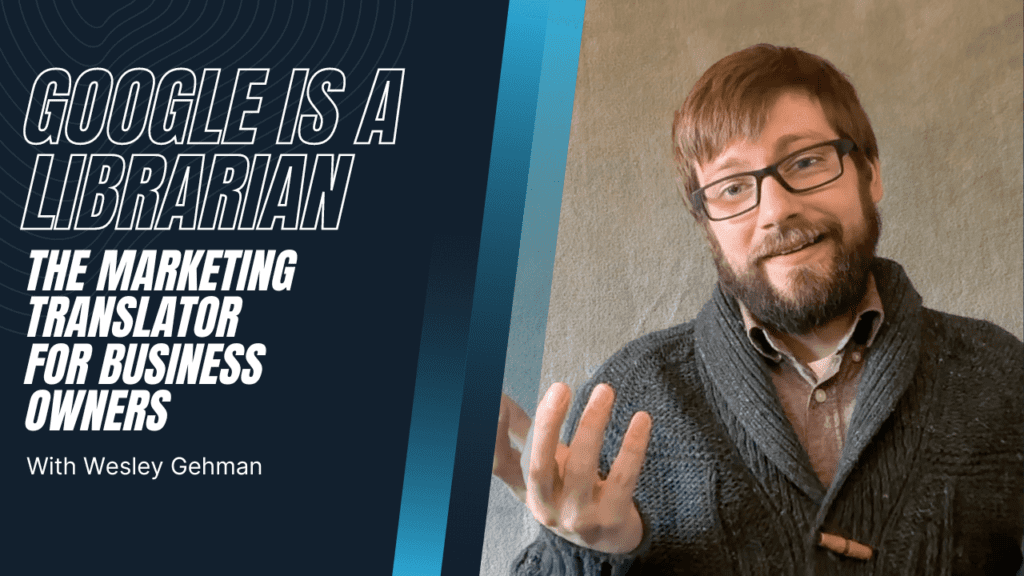How Is Google A Librarian?
Essentially, Google is a librarian because it organizes information and recommends websites as “books” that answer questions or provide solutions to the searches you perform online. The goal of Google is always to provide the answer or solution to its customers. Knowing this, we can curate our book (our website) in a way that allows Google to read our website and recommend it.
Key Video Takeaways:
- The idea that Google functions as a librarian is covered in the short YouTube video, along with how it applies to comprehending SEO.
- Google can be compared to a librarian who assists patrons in locating solutions by retrieving pertinent content from websites.
- Technical SEO, On-Page SEO, and Off-Page SEO are listed as the three main criteria for ranking in Google.
- It emphasizes how crucial it is to arrange and structure a website so that Google can read it effectively.
- The need to have reliable and quality industry-related material on a website is emphasized in the video.
- Personalization to your target audience is a key to success in SEO. Do not try to rank for everyone, try to rank for your perfect customer.
Questions To Ask Yourself As A Business Owner:
- How does my website reflect my business and what we do?
- What questions do my customers always ask, yet our website fails to answer?
- If Google is a librarian, how does it view my book? Who would it recommend my book to?
- If I were to add to my website, what would help my customers the most?
- What bad leads has my website produced in the past? Why has it produced those bad leads?
Understanding 3 Key Ranking Factors For SEO
Google uses thousands of factors to determine which websites it recommends when a search is performed in its library. As the author of our book and owner of our website, we have control over factors related to our website. Below are 3 key ranking factors and how they relate to Google being a librarian:
1. Technical SEO
Can Google read your website? There is a lot that goes into technical SEO. From your base code to your website’s code structure, along with a variety of technical SEO items. Learn more about technical SEO from us.
2. On-Page SEO
Consider your website a valuable content-filled book. Optimizing this information to make it relevant to Google is known as on-page SEO. This includes using strategic keyword research, crafting catchy meta descriptions, and organizing your content to encourage reading and user interaction.
Ask yourself: What is written on your website? What does your website design look like? If it isn’t written, you won’t rank for it. If it is ugly, you may rank, but very few people want to read it. What are on the pages of your website? That is a major factor in your ranking.
3. Off-Page SEO
Off-page SEO used to be referred to as link building simply, but it has become so much more. Off-page SEO can best be described as your brand’s popularity and evidence of your knowledge and expertise in your field. This is a challenging area of SEO that should be approached strategically and correctly.
Search Results Personalization
Similar to an experienced librarian who is aware of their clients’ preferences, Google customizes search results according to a user’s location, interests, and prior activities. This implies that different users may receive different results from the same search in Google.
Knowing Your Customer Is Vital
All growing businesses know that understanding and knowing their customer is vital to their success. To know your customer’s needs will allow you to help them more effectively. To be successful in Google’s library, you must have a deep understanding of your perfect customer. Understanding your customers’ interests, problems, and search patterns will help you design your website’s content to best suit their needs and searches.
Write Your “Book” And Grow Your Website
In the end, technical optimization and keyword research are not enough to get you ranked highly in Google’s search results. It entails building a website that genuinely benefits your audience—a book that Google is pleased to recommend. You should create a “book” that not only ranks highly but also resonates with your target audience by concentrating on producing high-quality content, establishing authority in your field, and understanding the needs of your clients. Together, let’s write your book and expand your website inside Google’s library of information.
When you treat your website like a book for your customers, you can reach them, you can innovate and change your industry, and you can grow your business. Start doing professional SEO to grow your business today.
YouTube Video Transcript:
(1) Google Is A Librarian | Understanding SEO | Marketing 101 | The Marketing Translator – YouTube
Hello, and welcome to the marketing translator! Today we are talking about understanding Google. The easiest way to understand Google is knowing that Google is a librarian.
All right, now that I’m in my “Librarian Outfit” let’s understand how Google being the librarian works with your website, which is your book. So now imagine, you walk into Google you have a question, “Google I have a question about this” and Google goes, “ah I’ve got got just the answer for you.” Google walks over goes through the bookshelf pulls your book your website off the shelf pages through and finds that exact blog post about the topic that you’re asking about and says, “here, here is your answer!” What now? What’s next? What, how did they even, how did Google even choose that one specifically out of all the ones that talk about that same topic? How does that work? What what’s going on here?
Google picks your website based on three factors and a lot of millions of other ones but there’s three key factors on getting your book (your website) ranking in Google.
- Can Google even read your website? Technical SEO
- Is there anything written on your website that makes it worthwhile for Google to actually recommend to people and give to people?
- Are you a trusted source? Is the content on your website trusted valuable and trusted by others within your field and industry?
In all of this, when you build your website it needs to be built correctly. The first one technical SEO your website needs to be organized structured and coded in a way that Google can read it and read it effectively.
Then the second one, what is written on your website what’s the content is it actually on talking about your industry and also on the content related topics. Does it have a variety of keywords not just the words you use to describe your service but a range of keywords.
And then third are there links going to your website? Do other books, like, think of a book, in the back there’s references to other websites or, well, other books. That’s what you need to be valid in in Google’s eyes. Because like for me, a web designer I could pop up a website tonight and start scamming people tomorrow if they get it ranking in Google. But Google doesn’t want to rank new spammy websites Google wants to answer the question that people have with a valid source that is resourceful and valuable and quality.
And that’s what you have to think about. Is my book, does my website provide that value and provide the information that people are looking for around my industry?
And always think of Google as a librarian that has so much information about each person. It’s not “potential client a” walked through the door and ask this question, it’s this person did a search about this topic and based on all their thousands of other searches based on all this history I know about them this is the perfect website for them. The other way to think about it is Google has a ton of information on people, creepy details on different people. So if I were to go to Google and be like “oh um archery supplies” they know from my past searches from my activity on Google as well as on my email as well as on different websites that I shoot traditional archery which is a recurve or longbow so they’re going to show results that are more tailored to that kind of information. Meanwhile most archers do like compound and shoot a compound bow they would show them different results from what I would look up and this is where it gets really beautiful on you can’t technically rank first in Google.
Essentially, if you target your customers correctly and know your customers really well you can make sure that when your customer goes to Google and say, “hey, I need help with this” they will then give your book, your website, to the perfect customer. And that’s where with your own website, branding, content ,what is written, how it is written, and what is said is so vital in ranking correctly and being recommended correctly by Google.
There are always tons of marketers and people coming out with ways to “trick Google” into ranking better and they usually fall flat on their face within a few months because Google’s main goal is to give the correct book to the correct person. It used to be if you ranked first in Google you ranked first in Google. Now it’s so personalized that you want to rank first in Google for your customer. And you can do that.
You can write your book in a way that Google recommends what you have written, recommends what’s on your blog, and recommends your website to your perfect customer. But what that takes, what that needs and requires is for you to know your customer, for you to know your product, for you to understand yourselves and develop the vision for your book to be the perfect book to Google for Google recommends. And that’s not always easy. It takes time, it takes a lot of thought, a lot of strategy, but the fun part is, when you build your website, when you write content on your website that is valuable, that is invaluable to so many people, you contribute to the library of Google in a way that is undeniable.
And when that happens, the amount of times that customers, that are the perfect customer, will find you in Google, is innumerable. So come along, let’s build your website; let’s build it out and grow your book and write your book so that your customers can find you and not just find you but learn from you. That you can really make an impact on your future customers today. Work Hard. Market Well.

